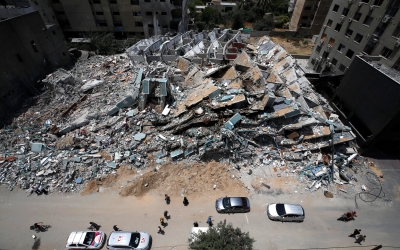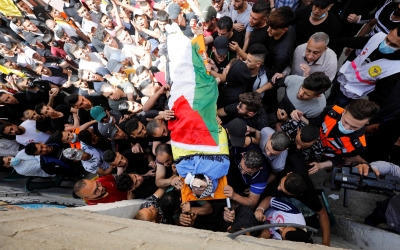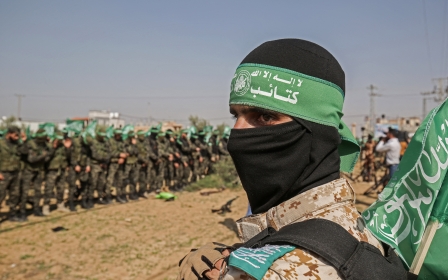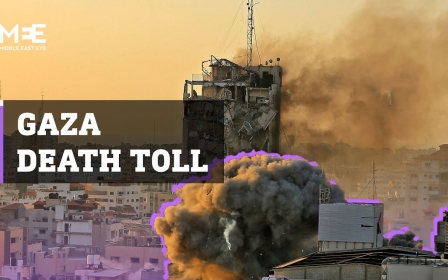Israeli bombardment of Gaza not a 'significant over-reaction', Biden says
US President Joe Biden is standing firmly by his administration's defence of Israel's most recent offensive on the Gaza Strip, which he said did not represent "a significant over-reaction" on the part of Israel, as the Palestinian death toll continues to rise.
Israel launched "Operation Guardian of the Walls" earlier this week, after Hamas began firing rockets into Israeli territory in response to Israel's attacks on al-Aqsa Mosque worshippers and its crackdown on protests in occupied East Jerusalem.
New MEE newsletter: Jerusalem Dispatch
Sign up to get the latest insights and analysis on Israel-Palestine, alongside Turkey Unpacked and other MEE newsletters
While Hamas' rockets came in reaction to Israel's crackdown, Biden believes the Islamist group that governs the under-siege Gaza Strip is the main aggressor.
The US president, during a press conference on Thursday, also noted diplomatic efforts had seen Washington reach out to regional partners.
"I have my intelligence community, the Defense Department, as well as the State Department… in contact with all of their counterparts, not only in Israel, but in the region, and one of the things I have seen thus far is there has not been a significant over-reaction," Biden said.
"The question is how do we get to a point - they get to a point - where there is a significant reduction in the attacks, particularly the rocket attacks that are indiscriminately fired in the population centres, but I expect I'll be having some more discussions," he said.
"We haven't just spoken with the Israelis - it's been the Egyptians, the Saudis and others - so it's a work in progress right now," Biden continued.
The US president did not mention Palestine or the Palestinians by name during his remarks.
'Achieving stability'
During the recent upheaval, Hamas rockets have been responsible for the deaths of seven people in Israel, including a soldier and two Palestinian citizens of Israel, according to medical officials.
Meanwhile, Israeli air strikes have killed 103 people, including 27 children and 11 women, as of Thursday evening, and a number of high-rise buildings, public markets and businesses have been levelled. Israel has for more than 15 years maintained a land and sea blockade of the Gaza Strip, as well as controlling its airspace, with sole control over who and what can come or go from the densely populated enclave.
'In our view rocket attacks from Hamas into civilian neighbourhoods is not self-defence'
- Jen Psaki, White House press secretary
In the occupied West Bank, Israeli forces killed three Palestinians on Wednesday.
The Palestinian Red Crescent Society, working in the occupied West Bank and East Jerusalem, reported 980 injuries in the period between 8 and 12 May, including 77 live bullet injuries, 197 rubber-coated steel bullet injuries, 637 tear gas-related injures, and 68 injuries as the result of "assault, beating, falling and burns".
The situation in Gaza, Israel and the occupied West Bank continues to escalate, with reports of civilians - both Jewish-Israelis and Palestinian citizens of Israel - exchanging fire on the streets of several cities.
Meanwhile, White House Press Secretary Jen Psaki, during a news conference that followed Biden's, also underlined Hamas' role as the aggressor, while calling for a de-escalation of violence.
Psaki said that the US had reached out to Qatar, Egypt, Tunisia and other regional partners "who can play an integral role in influencing Hamas to de-escalate".
"The role we are playing at this point in time is to communicate, not only with the Israelis and the Palestinians [with] the goal and the objective of reducing violence and achieving stability, but also with key partners in the region," Psaki said.
She also noted that Biden spoke with Israeli Prime Minister Benjamin Netanyahu on Wednesday and that Secretary of State Antony Blinken had been in contact with Palestinian Authority President Mahmoud Abbas.
Psaki repeatedly underlined the "tragedy" of any loss of life, but, like Blinken, refused to acknowledge whether Palestinians had the same right to defend themselves as Israelis.
"In our view rocket attacks from Hamas into civilian neighbourhoods is not self-defence," Psaki said.
When asked about the administration's position on Israel's attempt to evict Palestinians from their homes in occupied East Jerusalem's Sheikh Jarrah neighbourhood - the issue that began the current upheaval - Psaki reiterated the need for de-escalation.
Middle East Eye delivers independent and unrivalled coverage and analysis of the Middle East, North Africa and beyond. To learn more about republishing this content and the associated fees, please fill out this form. More about MEE can be found here.






